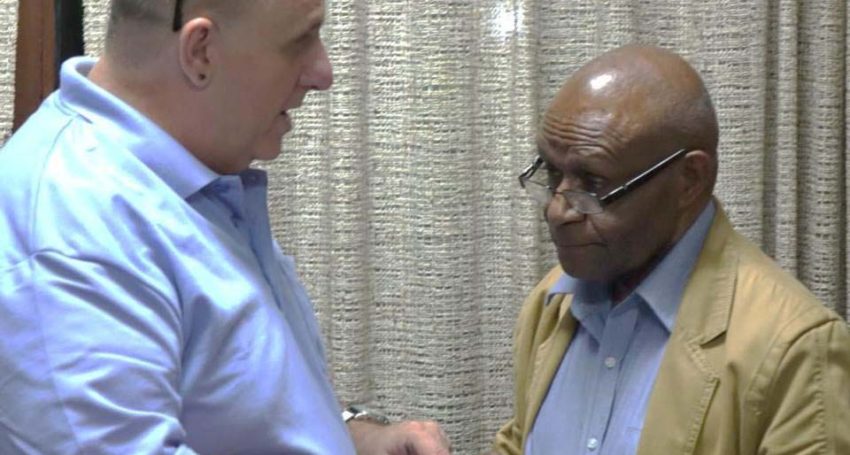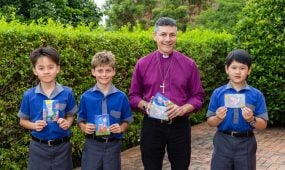West Papuans: the right to freedom
Features
“In my six visits to West Papua since 2015, I have certainly sensed the fear that naturally comes when acts of unbelievable brutality are perpetrated against the West Papuan community…However, I have also seen and experienced the indomitable hope for freedom and justice welling up in the hearts of Papuans when I have spent time with them,” says Peter Arndt

On 17 November last year, a friend of mine, Wensi Fatubun, was one of dozens of people arrested by Indonesian police in the city of Merauke in West Papua simply for attending a meeting organised by the Papuan People’s Assembly. Wensi works for the Papuan People’s Assembly, which had organised a meeting to evaluate a program intended to improve the lives of Papuans, ‘Special Autonomy’ (a 20-year funding program initiated in 2001 by the Indonesian Government ostensibly to improve living standards of Papuans).
Wensi and others were detained and interrogated for many hours. Their mobile phones and laptops were confiscated and searched. Over a day later, they were finally released and their property returned to them.
This is commonplace in West Papua. It has been happening since Indonesian security forces set foot on Papuan soil back in the 1960s – along with much, much worse.
West Papua was occupied by the Dutch in the 19th Century. The Indonesian Republic came into being when the Dutch relinquished control over the islands to the west of what we know as West Papua, but they retained control over the western half of the island of New Guinea. They were preparing it for independence. However, the then Indonesian President, Sukarno, was keen to have the remaining Dutch territory as part of his Republic and the United States keen to ensure that Indonesia stayed in its camp in the Cold War era, forged a deal which saw the territory handed over to Indonesia with the proviso that all adult Papuans got the chance to vote in a referendum on Indonesian sovereignty over their land.
The arrival of Indonesian troops in 1963 began an unrelenting period of violence and intimidation. It aimed to keep a lid on Papuan efforts to advocate for independence. A referendum on integration into the Republic of Indonesian was held in 1969, but only 1,026 hand-picked Papuans, subjected to weeks of intimidation and threats, were assembled to vote in eight assemblies in various cities. The result was predictable, with Indonesia maintaining sovereignty over West Papuan land. And, even though the United Nations gave its stamp of approval to this shonky outcome, Papuans continued to resist Indonesian occupation. They have paid a high price for their resistance with thousands being killed in the following 50 years. Credible reports over the years attest to some of the most horrific massacres perpetrated by Indonesian security forces.
Advertisement
From those early days until now, many Indonesian authorities would speak of Papuans disparagingly. Many have spoken of needing to “civilise” Papuans. This deeply ingrained racism was on show in August 2019 when Indonesian extremists surrounded a dormitory in the Javanese city of Surabaya where Papuan students were living, abusing them and calling them “monkeys” and “dogs” and urging them to go back to Papua. Police arrived at the scene, but they backed the extremists rather than protecting the Papuan students. The incident led to a wave of anti-racism demonstrations in cities across West Papua. Dozens were killed and there was much property destruction. University students who led the demonstrations were targeted for arrest and friends who provided legal support told me that the students were tortured for several days before they had access to legal support. Almost all were convicted of offences from incitement to property destruction and jailed for up to six months.
The police used the unrest as a cover for a sweeping operation to find and detain leading figures in the nonviolent political movements pushing for self-determination. That led to the arrest of seven key Papuan political figures who were subsequently flown to Balikpapan in East Kalimantan where they were tried on trumped-up charges connecting them to the demonstrations and destruction. Of course, they were convicted and received sentences of less than a year, much less than what the prosecution recommended. It’s believed that the significant international pressure applied by human rights groups forced this outcome.
Advertisement
Political and civil rights like freedom of expression and assembly are routinely ignored by Indonesian security forces in West Papua. When Papuans came out in their thousands in 2015 and 2016 to support the United Liberation Movement for West Papua (ULMWP) and its push for support for recognition by Pacific countries, Indonesian authorities broke up the demonstrations, arrested large numbers of people and beat and tortured them. In 2020, authorities again broke up demonstrations rejecting Special Autonomy in several cities and arrested demonstrators (it was apparent to Papuans that the program had failed in its objectives to raise Papuans’ living standards and to address the fundamental issue at the heart of the conflict in West Papua). The Indonesian Government intends to renew the failed Special Autonomy funding program, and in association with this to add a further province in the Papuan region.
In the Highlands, where many of the armed resistance operate, military and police numbers have increased dramatically since the killing of several Indonesian construction workers, whom the resistance claims were members of Indonesia’s military building President Widodo’s Trans-Papua Highway in December 2018. Civilians have subsequently been killed by Indonesian soldiers conducting sweeping operations. Included in their number are several Protestant and Catholic clergy and church workers. The sweeping operations and civilian killings generate great fear among villagers. Due to the killings and property destruction at the hands of Indonesian soldiers, thousands have fled to the forests for safety, but many have suffered from deprivation and illness or even died as a result.
Papuan church leaders have spoken out about their concerns since. Protestant and Catholic leaders associated with the West Papua Council of Churches have issued public statements expressing concern about the militarisation of West Papua and the failure of Special Autonomy. Over 50 Catholic priests also issued two public statements expressing concerns about Indonesian racism towards Papuans and about the failure of Special Autonomy. All of these church leaders have been subjected to pressure, threats and intimidation from authorities and even from Indonesians from within their own churches because of their public statements.
So, despite many Australians not knowing it, there has been a long-running conflict on our doorstep. Much blood has been shed in the past six decades and the fundamental political, civil, social, economic and cultural rights of the Indigenous peoples of West Papua have been routinely violated by Indonesian security forces and authorities. Overwhelmingly, Papuans clearly do not want to be Indonesians, both because they do not want to be subjected to the marginalisation and humiliation which accompanies the widespread racism practised by many Indonesian authorities and civilians and because they want to be free Papuans in the land which has been theirs since the beginning.
The Indonesian Government continues to use a security approach to deal with the conflict. It has been spectacularly unsuccessful! Papuans continue to resist occupation despite the massive imbalance of power. In my view, Papuan resistance is powered by an indefatigable belief in their right to be free in their lands. That belief is God-given.
In my six visits to West Papua since 2015, I have certainly sensed the fear that naturally comes when acts of unbelievable brutality are perpetrated against the West Papuan community. To see your teenage children gunned down in cold blood by Indonesian soldiers, as happened to the people in Paniai District on 8 December 2014, does that to you. However, I have also seen and experienced the indomitable hope for freedom and justice welling up in the hearts of Papuans when I have spent time with them.
I don’t think it’s an accident that the symbol of Papuan freedom is the Morning Star. Just as Jesus, ‘the Morning Star’, shines the light of hope on all who believe in him, as he stirs the hope of freedom in the hearts of West Papuans and gives them the courage to resist the might and power of Indonesian occupation. It’s a resilience that is amazing to experience and deeply, deeply humbling.
There are three things you can do to help the people of West Papua:
- Pray for the people of West Papua, especially those who continue to be displaced due to ongoing Indonesian military activity.
- Stay informed about developments in West Papua by visiting the International Coalition for Papua website, which is largely comprised of faith-based organisations
- Contact your Federal elected representative and ask them to advocate for a United Nations Human Rights Mission to West Papua.





